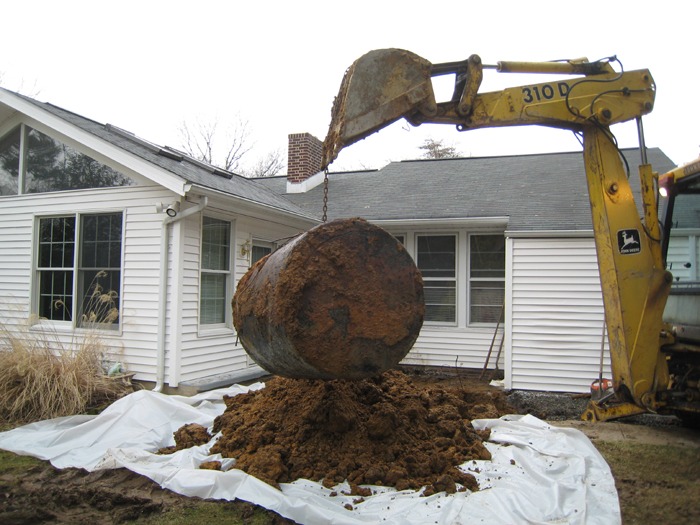NJ Oil Tank Laws to change in 2018

The New Jersey Department of Environmental Protection (NJDEP) has proposed new rules regarding underground heating oil tanks.
Have an Oil Tank Sweep performed to clear your property.
Whether you are a homeowner, buyer, seller, or real estate agent the new proposed rule changes regarding heating oil tanks apply to you. The standards, laws, and liability of having an underground storage tank on your property are becoming increasingly strict and regulated. American Geophysics specializes in NJ oil tank sweeps, we implore you to do your due diligence and have your property scanned to avoid any unforeseen costs when buying or selling a property.
The Heating Oil Tank System (HOTS) Remediation Rules (N.J.A.C. 7:26F) will pertain to specific unregulated heating oil tanks (i.e., residential heating oil tanks, and non-residential heating oil tanks less than 2,000-gallons in volume) and their associated piping. These heating oil tank systems can be either aboveground or underground storage tanks. Heating oil includes No. 2, No. 4, and No. 6 heating oil, and kerosene when those fuels are used for heating purposes (as opposed to industrial use, motor fuel, or resale).
The proposed rule changes are currently on schedule for July 2018 and are as follows: (NOTE: Not all of the proposed changes may be adopted, however, the overall liability of the owner stands to increase).
NJDEP is recommending a series of “minor” and “non-minor” violations and associated fines to help enforce the proposed rules.
- The owner of a heating oil tank system is now required to notify the NJDEP when a discharge is discovered, regardless of who discovers it, and requires the owner to comply with the notification requirements established by the NJDEP in their Administrative Requirements for the Remediation of Contaminated Sites (ARRCS) at N.J.A.C. 7:26C-1.7(j); Within 48 hours of the discovery of the release, the owner is required to hire either a certified subsurface evaluator or a Licensed Site Remediation Professional (LSRP) to remediate the discharge; If the discharge of heating oil is less than 100 gallons and does not reach surface water or groundwater, the responsible party may remediate the discharge under the oversight of local authorities (NJDEP will not issue a HOTS NFA under these circumstances).
- Prescriptive technical requirements are in the regulation, not a separate guidance document. (Example) If free product (FP) is identified as originating from the heating oil system, the owner must initiate FP removal within 60 days, and delineation and FP remediation must be completed within one year.
- Groundwater must be investigated when: any portion of the heating oil tank system is located within the seasonal high groundwater table or within two feet of either groundwater or bedrock; soil sampling indicates the presence of a heating oil-related contaminant above the site-specific impact to groundwater soil remediation standard; or excavation of contaminated soil is continued down to bedrock or groundwater.
- Distinct sets of instructions for soil sampling and analysis have been established; Specific Receptor Evaluation requirements and timeframes must be adhered to if a site contains FP and/or groundwater impact from the HOTS; removal of the requirement to analyze groundwater for Tentatively Identified Compounds (TICs) for #2 oil discharges only.
- Under specific conditions, an LSRP can establish a “HOTS Deed Notice” (HDN) and leave contamination in place. The HDN does not require an NJDEP Remedial Action Permit -Soil, NJDEP fees, or biennial certifications; and If there is residual contamination (defined as “estimated to be less than 15 cubic yards) under a residential building, an LSRP can leave the contamination in place by implementing a Small Quantity Exception. This option does not require a Deed Notice; Both of the above options are only applicable to residential properties, and cannot have impacted groundwater, or pose a threat to public health or the environment.
- The proposed new chapter (7:26F) will not apply if the heating oil tank system is located on a property that is subject to Industrial Site Recovery Act (ISRA). The NJDEP will not issue a No Further Action (NFA) letter for the ISRA subjected site.
Given the large quantity of unknown and unregulated USTs within the state of NJ any property owner or buyer that suspects the possibility or historical evidence of a UST existing should have a survey done on their property. American Geophysics can provide you with a comprehensive and professional survey detailing all findings in a tailored report. Contact us today to put your mind at ease and avoid a potentially costly problem.

